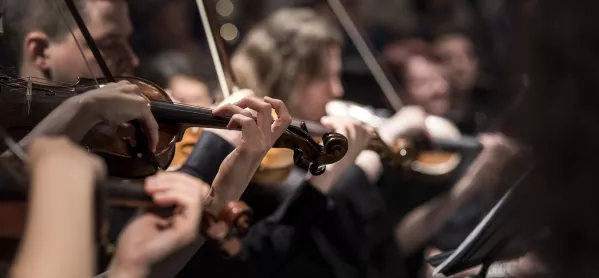One of the most moving artistic projects I’ve seen in recent times took place in the assembly hall at Cumnock Academy in East Ayrshire. It brought together the Edinburgh Quartet, the Citizens Theatre, student actors and composers, along with primary-age musicians and dancers, to bring alive long-gone Ayrshire voices to retell their First World War stories.
The end result was a triumph for the director, Sir James MacMillan, and all involved in developing and performing this exceptional creative collaboration. For me, it encapsulated the incredible connective power that culture can have in Scotland, but also the urgency to ensure that young people have affordable access to the performing arts - and that access alone is not where engagement stops.
Scotland is an egalitarian nation that prides itself on people from all walks of life enjoying and taking part in the artistic life of communities and cities. But that breadth of audiences and artists cannot be sustained if young people are struggling to find affordable pathways to meaningful progress in the arts.
Access is vitally important and all young people should have arts as an integral element of their education, just like PE. But equally important is the chance to progress in the performing arts in a way that is both accessible and affordable.
Keep advocating for the arts
The tensions of accessibility and affordability couldn’t come at a more precarious time, as we embark on our fourth industrial revolution. If this revolution is a cognitive one, where automation will do more things that humans used to do, then we need to harness our creativity, our empathy and our understanding of multicultural societies more than ever. It is sustained learning and teaching in performing arts that will help give our children the adaptable skills they will need to not only survive in the future, but to shape it.
I’ve seen real innovation in East Ayrshire, where primary schools have invested in group music teaching that feeds into a hub delivered in partnership by ourselves and Dumfries House - an 18th century A-listed house and estate owned by a charitable trust - for subsidised one-to-one lessons. They’ve created that welcome initial access to music education for hundreds of children and our partnership (along with secondary school music staff) supports and enables progression. We also have a ballet programme there that is already feeding into our Junior Conservatoire.
Constrained finances and competing priorities at local authority level can keep too much focus away from what’s critical in the longer term. We can point this out until we are blue in the face, but I also think we, as arts organisations, need to be part of the solution. We need to share best practices as vigorously as we share our advocacy. Only by putting our money where our mouth is can we make the real and beneficial change.
If every conservatoire, specialist school and community arts organisation gave some thought and attention to helping a local authority achieve access, diversification and progression in the arts, we could do some amazing things together. So let’s keep advocating for the arts - and proposing and pioneering innovative solutions to help them thrive.
Professor Jeffrey Sharkey is principal of the Royal Conservatoire of Scotland
